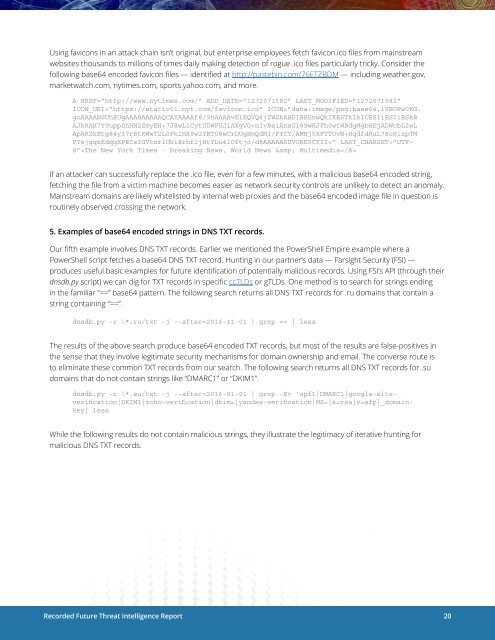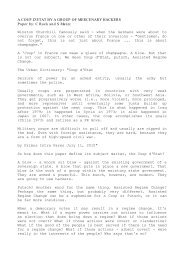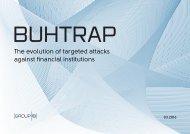A Hunting Story
rep-2016-9006
rep-2016-9006
You also want an ePaper? Increase the reach of your titles
YUMPU automatically turns print PDFs into web optimized ePapers that Google loves.
Using favicons in an attack chain isn’t original, but enterprise employees fetch favicon.ico files from mainstream<br />
websites thousands to millions of times daily making detection of rogue .ico files particularly tricky. Consider the<br />
following base64 encoded favicon files — identified at http://pastebin.com/76ETZBDM — including weather.gov,<br />
marketwatch.com, nytimes.com, sports.yahoo.com, and more.<br />
A HREF=”http://www.nytimes.com/” ADD_DATE=”1272071582” LAST_MODIFIED=”1272071582”<br />
ICON_URI=”https://static01.nyt.com/favicon.ico” ICON=”data:image/png;base64,iVBORw0KGgoAAAANSUhEUgAAABAAAAAQCAYAAAAf8/9hAAAAvElEQVQ4jZWSbRHDIBBEnwQkIKESTkIkICESIiESIiESkB<br />
AJkRAH7Y9uppShHN2ZmyEH+7J8wLiCytUDWFUJiAXgVO+nIvBs1AnsGl89wKJFh0wtWBdgMgbBEjADWcbL2wL<br />
ApARZkEtg84y37r8tRWwT2L0Fk2HX9w2YBT08wCrDUgEmQdNI/FYCY/AMNj5XFTTOvN+HqdfdRuL78cRizpTM<br />
PYejgqxKdqqXPECsIGVtnrlUkiErhf1jHtYLu4lOftjo/d8AAAAASUVORK5CYII=” LAST_CHARSET=”UTF-<br />
8”>The New York Times - Breaking News, World News & Multimedia<br />
If an attacker can successfully replace the .ico file, even for a few minutes, with a malicious base64 encoded string,<br />
fetching the file from a victim machine becomes easier as network security controls are unlikely to detect an anomaly.<br />
Mainstream domains are likely whitelisted by internal web proxies and the base64 encoded image file in question is<br />
routinely observed crossing the network.<br />
5. Examples of base64 encoded strings in DNS TXT records.<br />
Our fifth example involves DNS TXT records. Earlier we mentioned the PowerShell Empire example where a<br />
PowerShell script fetches a base64 DNS TXT record. <strong>Hunting</strong> in our partner’s data — Farsight Security (FSI) —<br />
produces useful basic examples for future identification of potentially malicious records. Using FSI’s API (through their<br />
dnsdb.py script) we can dig for TXT records in specific ccTLDs or gTLDs. One method is to search for strings ending<br />
in the familiar “==” base64 pattern. The following search returns all DNS TXT records for .ru domains that contain a<br />
string containing “==”.<br />
dnsdb.py -r \*.ru/txt -j --after=2016-11-01 | grep == | less<br />
The results of the above search produce base64 encoded TXT records, but most of the results are false-positives in<br />
the sense that they involve legitimate security mechanisms for domain ownership and email. The converse route is<br />
to eliminate these common TXT records from our search. The following search returns all DNS TXT records for .su<br />
domains that do not contain strings like “DMARC1” or “DKIM1”.<br />
dnsdb.py -r \*.su/txt -j --after=2016-01-01 | grep -Ev ‘spf1|DMARC1|google-siteverification|DKIM1|zoho-verification|dkim=|yandex-verification|MS=|k=rsa|v=sfp|_domainkey|<br />
less<br />
While the following results do not contain malicious strings, they illustrate the legitimacy of iterative hunting for<br />
malicious DNS TXT records.<br />
Recorded Future Threat Intelligence Report<br />
20








